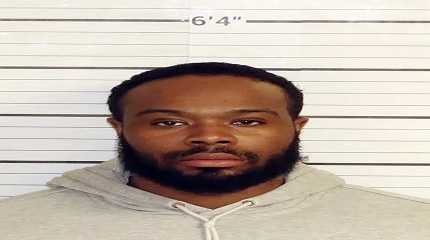
MEMPHIS, Tenn. (AP) — Years before Memphis Police officer Demetrius Haley pulled Tyre Nichols from his car on Jan. 7, setting in motion a deadly confrontation, Haley was accused of taking part in the savage beating of an inmate at a county prison.
The 2015 assault of the inmate was so disturbing that 34 others — the entire cellblock — signed a letter to the corrections director.
“We are truly asking that this matter gets looked into before someone gets hurt really bad or lose their life because of some unprofessional officers,” the letter stated.
The warning from dozens of inmates at the Shelby County prison is the clearest indication yet that one of the five officers who took part in the violent beating of Nichols had an event in his past that should have raised concerns before he was hired as a police officer. Nichols died three days after the beating.
The letter asks how the inmates are supposed to feel “safe and secure when the staff members at the Shelby County Correctional Center are assaulting and threatening us?”
It concludes, “Please put a stop to this madness.”
Shelby County did not respond to a request Friday seeking information about its investigation into the beating allegations, so it is unclear if Haley was disciplined or cleared of the assault. An email was sent Friday to a police spokesperson asking if the department knew about the allegations when Haley was hired.
There is no national database of officers found guilty of misconduct who resign or are fired, meaning in a lot of cases they can apply for jobs in other police agencies and departments. There is a national database for officers who lose their certification — the equivalent of their professional license to be a police officer in a particular state. That wouldn’t have made a difference in Haley’s case because his job at the county prison didn’t require police certification.
The former officer has been charged with second-degree murder in Nichols’ death, along with ex- officers Tadarrius Bean, Desmond Mills Jr., Emmitt Martin III and Justin Smith. All except Bean have infractions in their work records. Policy violations include using minor physical force during an arrest and failing to fill out a form about it; failing to report a domestic violence situation; and a car crash, records show.
The prior accusations against Haley came to light because the inmate, Cordarlrius Sledge, filed a federal lawsuit in 2016 against him and two others. It accused Haley and another officer of punching him, and a third of slamming his head into the floor. The suit was ultimately dismissed on procedural grounds, because Sledge had failed to file a grievance with the prison, which houses inmates in the Memphis area who have been tried and convicted.
Haley continued to work for the Division of Corrections until hired by Memphis Police in 2020, at a time when the department was lowering its standards for recruits in an attempt to fill vacancies. According to records in his personnel file, a previous application to the police department was rejected, but the reason for that rejection is blacked out.
A sixth officer who participated in Nichols’ arrest and beating, Preston Hemphill, has been fired but not criminally charged. He initially failed a physical after he was hired in 2019 and spent several months in a civilian position.
Van Turner, president of the NAACP’s Memphis branch, said Tyre Nichols’ death could have been prevented if the police department had not hired Haley.
“The culture of violence and bravado and the lack of empathy for individuals is not only here in our neighborhoods and communities, but unfortunately also in our jails and prison system,” said Turner, who is running for mayor.
Haley, Hemphill, and the four other officers were all eventually assigned to the Scorpion unit, an acronym for Street Crimes Operations to Restore Peace In Our Neighborhoods. The anti-crime task force that Memphis Police Director Cerelyn “CJ” Davis started when she took over the department in June 2021 was designed to focus on repeat violent offenders, but has been accused of violent and illegal tactics.
Black residents of Memphis have described police sweeps in which unmarked cars roll into neighborhoods and armed plainclothes officers jump out, rushing traffic violators and issuing commands. The resulting fear has led people to text, call and use social media to caution each other to stay inside or avoid the area when police operations are underway.
Davis initially defended but later disbanded the Scorpion unit after Nichols’ death.
Haley has not spoken publicly about his role in Nichols’ arrest and beating. He declined to make a statement at his disciplinary hearing, and his attorney has declined to comment. When a reporter from The Associated Press knocked on Haley’s door this week, no one answered.
Neighbors who live in single-family homes near Haley, in a quiet section of the Memphis suburb of Cordova, said he moved into the house about two years ago. Michael Cassie said he didn’t have many conversations with Haley, but the ones he did have were friendly. Haley mostly kept to himself and has not been seen around the neighborhood in recent weeks, said Cassie, a 74-year-old minister.
Asked about his reaction when he learned of Haley’s involvement with Nichols, Cassie said, “I was totally shocked that it was him.”




